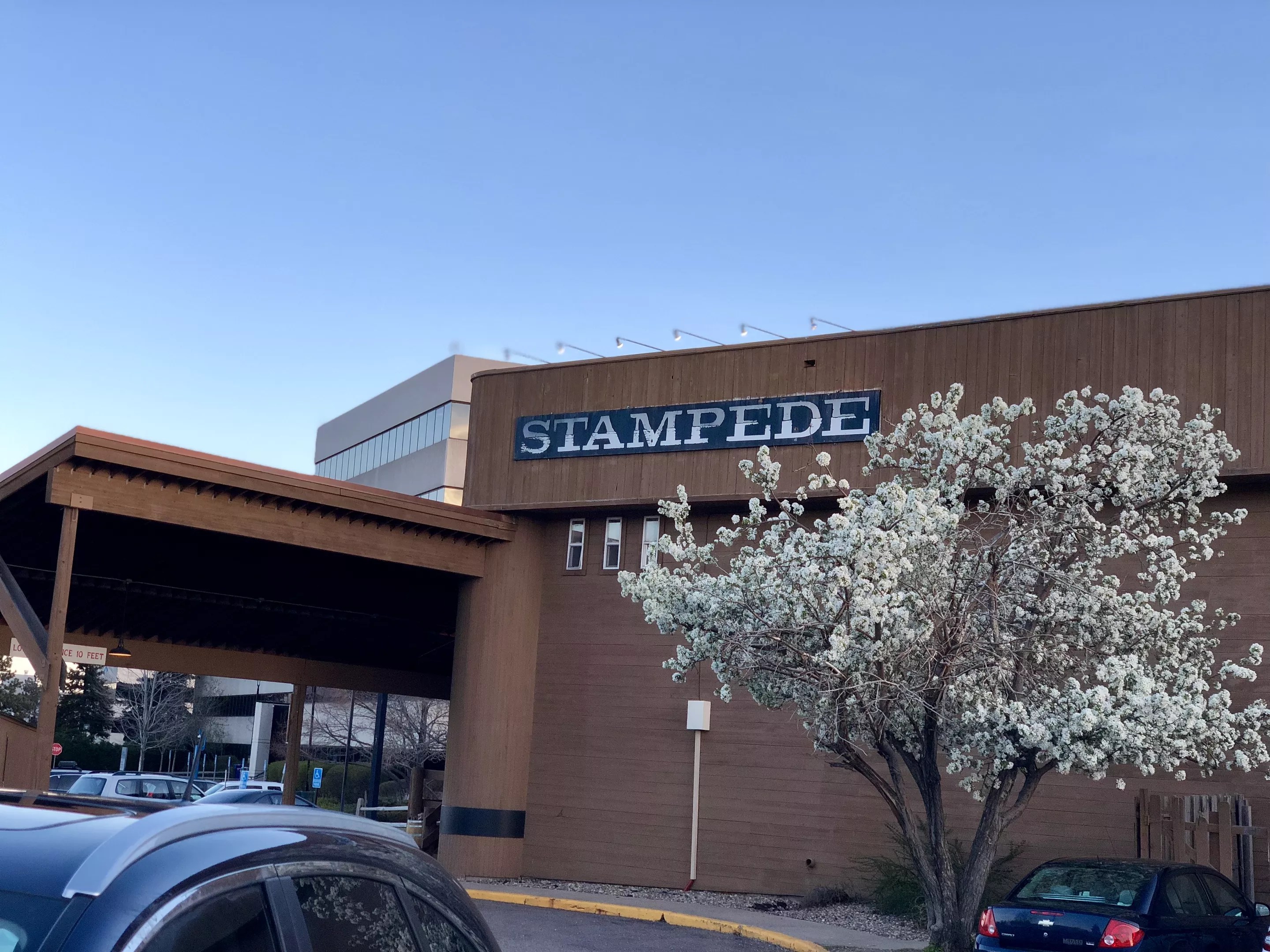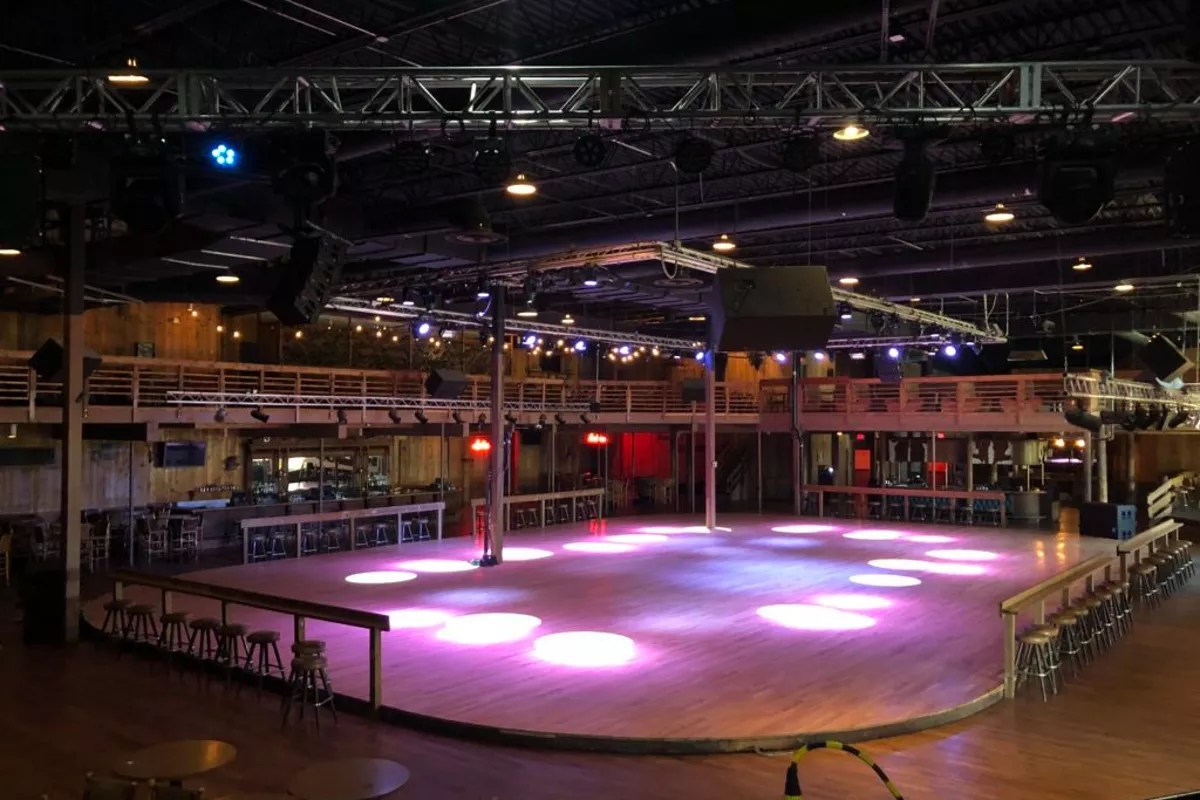
Maureen Witten

Audio By Carbonatix
Once a hot spot for line, square and swing dancing with live country-Western bands, Stampede has taken on a new role as a club for Latin genres like rancho, banda, regional Mexican, Norteño and cumbia under the ownership of Chris Swank.
Swank also owns Denver’s best Latin dance joint, La Rumba, as well as the Bluebird Theater on East Colfax Avenue, the neighboring Mezcal and the building that houses Goosetown Tavern, which he also used to run. That makes it tempting to compare Stampede’s new style to La Rumba’s, but Swank compares it more to “rock venues” like the Fillmore Auditorium or the Bluebird, just with Spanish-language music.
“The Stampede is more catering toward live music, bigger bands with bigger production,” he says. “It’s more of a concert venue. A lot of the bands are coming from Mexico, but then a lot are also coming from Colombia or Venezuela.”
The wooden exterior of Stampede, its patio jutting out under pines and overlooking hills and fields spreading out around the Cherry Creek Trail, gives the venue a rustic cowboy look. It has two floors and sits in a prime spot on the border between Aurora and Denver at 2430 South Havana Street, at the start of a popular business corridor.
Under Swank’s ownership over the past six years, the programming has moved into a “versatile” mix of Latin genres. Swank’s own Latino roots reach back four or five generations to Mexican ancestors in the San Luis Valley when it was still part of Spain.
Every weekend, Stampede now features bands from northern Mexico that share a few aesthetics with country-Western music, such as cowboy hats (but pointier boots). Bands from states like Chihuahua, Sonora, Nuevo Leon and Durango come to play banda, regional Mexican and ranchera, genres known for their large brass ensembles.
Occasionally, the club hosts singers and bands performing mariachi, the elegant and most famous Mexican musical style. Several times a month, guests can dance to cumbia, which originated in Colombia but was popularized and evolved into subgenres in Mexico.

Longtime Stampede lovers may notice that the saloon in the middle of the dance floor is gone; Chris Swank removed it to create a “huge” space for dancers and concert-goers.
Courtesy of the Stampede
In August, Stampede hosted the cumbia band Grupo Kual, a Mexican group known as one of the pioneers of cumbia sonidera, a fast-paced subgenre with pop beats. In February 2023, it hosted Raymix, a popular cumbia DJ who played at Stampede in 2019, as well.
“Los Dos Carnales recently played; we always do Los Invasores de Nuevo Leon, a big band; Los Tucanas de Tijuana,” Swank says. “We’ve also done bands that are now too big for the Stampede, like Grupo Firme; they played at the Stampede, and they most recently played at Ball Arena.”
On Sunday, May 5, the venue will bring in Alex Ubago, a Spanish singer and ballad writer. On May 17, the headliner will be Alex Manga, who performs Colombian pop, and Vallento, a folk music genre. It will have an international dance night on May 19, with cumbia and regional Mexican performers from Mexico and Colombia.
The range of styles at Stampede is wider than what dancers find at La Rumba, which stays true to the rhythms of salsa, bachata, merengue and cumbia, the main genres for any Latin dance club.
Stampede was built in 1994, the same year that Swank bought the Bluebird Theater, the concert venue that launched his career as a business owner and promoter. Until Swank bought the venue in 2018, weeknights were all about country-Western music and folks in cowboy hats two-stepping and boot-scooting around the saloon in the middle of the circular dance floor.
“It’s been around forever. It’s a venue that I think everybody knows,” Swank says. “It’s got a really great country aesthetic, it’s cowboy-themed, lots of wood in the venue. It’s like a big dance hall. I think it forever was that, and I think it forever just served that particular demographic. It was just a country-Western bar.”
Swank had just returned from a sojourn in Argentina, where he’d taken his family to live for five years after getting burned out from running four businesses, when he bought the place in 2018. Although Stampede had occasionally hosted Latin nights before Swank bought it, he steered it away from country-Western entirely.

Stampede, which has two levels and a huge dance floor, has no problem reaching its 1,000-person capacity with the top-notch Latin bands it brings in.
Courtesy of the Stampede
“It was a wonderful experience, learning another culture, being an immigrant, seeing everything from the other side,” he says of his time away. “When I came back to Colorado and found that the owner wanted to sell the Stampede, I just thought, ‘Wow.’ It seemed like a good market.”
After buying the place, Swank renovated the interior. “The venue was really in disrepair, so we’ve had to invest a lot of money in fixing everything, putting in a new stage and new lights,” he says. He got rid of the bar in the middle of the dance floor, “just to make the dance floor huge.” But he was careful to keep the familiar exterior and the building’s character.
“We haven’t changed a lot,” Swank says. “It’s still the same. It’s just fixing and replacing and renovating, is what we’ve done, and just kind of give it a new look and invested money in floors, in production equipment and sounds, just done a lot of things on the exterior. But the building itself is the same as it’s always been.”
The programming is not. When he bought the place, he realized that the metro area “is growing, is becoming a bit more cosmopolitan,” Swank says. “It’s a huge mix of people who are immigrating, there’s a lot from Mexico, there’s a huge Central American population from El Salvador, Honduras.”
Swank recognized that Stampede could tap into that underserved group of Latin American immigrants who miss the music from their native countries.
“As the demographics change, there’s a market for those people who are here and don’t have the ability to go back home. Seeing a band that’s important to them or a singer that’s from their youth or that was a big star in their country, to be able to see them in Denver, it’s huge for them,” he says. “I learned that in Argentina. You get home sick, you’re there and you don’t have any of your culture that you grew up with available to you. I really see how powerful that is.”
And it created a powerful business plan.
“We’ve done bands and artists and singers from almost every country in Latin America,” Swank says. “The bigger ones are Mexico, obviously, and even within Mexico, there’s so many different genres and there’s different kinds of music and different bands depending on what region it is.”
Stampede kept the line-dancing lessons and country music on Wednesdays, which are also ladies’ nights. Mondays are swing nights, so “it’s not that it’s become 100 percent Latin,” Swank admits. The club even hosted a Van Halen tribute band last week.
The combination of a little bit country and a lot of Latin is working out, he says.
“We’ve settled into kind of a good run. It seems like the bands know us, they like it as a place to play, they like that it’s professional,” he adds. “We’re going to keep doing what we’re doing.”